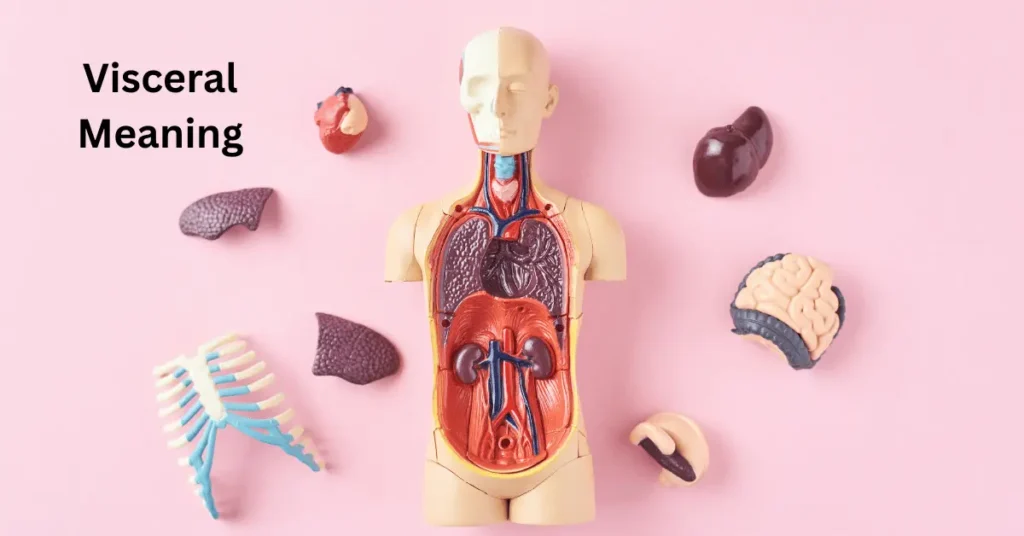Visceral Meaning

Have you ever had an experience or emotion so strong that it felt like it was coming from deep within your body? That’s the essence of what we mean when we talk about “visceral meaning.”
The word “visceral” is often used to describe feelings, reactions, or experiences that seem to come from the core of our being—almost as if they’re felt in our internal organs.
But there’s more to it than just this gut-level sensation.
In this post, we’ll explore what “visceral meaning” really means, how it evolved, and how it’s used today to describe those deeply emotional, instinctive reactions we sometimes have.
What Does It Mean?
When we talk about “visceral meaning,” we’re referring to something that is felt deeply, often in a way that’s hard to explain or put into words.
The word visceral comes from the Latin word viscera, which means the internal organs of the body—things like your stomach, intestines, and heart.
So, in its most literal sense, visceral relates to the deep, physical sensations we experience within our body.
However, in the broader, metaphorical sense, when something is described as visceral, it’s not just about what we feel physically.
It’s about those intense, gut-level reactions that arise from deep within us. Imagine watching a movie that leaves you breathless, or reading a book that makes your heart race—these are examples of visceral reactions.
They happen quickly and instinctively, often before our brain has had a chance to process them fully.
In everyday language, “visceral” is often used to describe powerful emotions like fear, excitement, or disgust.
It’s that feeling in your gut that tells you something is right or wrong without needing any logical explanation.
So, when we say something has “visceral meaning,” we’re referring to its ability to evoke a strong emotional or physical reaction, one that’s deeply felt and not just understood with the mind.
In short, “visceral meaning” describes those deep, raw, and almost physical experiences that come from the heart or gut, rather than from the head.
Visceral Meaning: Definition and Examples
Definition
The term “visceral meaning” refers to something that is deeply felt, often at a physical or emotional level, as if it originates from within the internal organs of the body.
The word “visceral” is tied to the word viscera, which refers to the internal organs like the heart, lungs, and stomach.
When something is described as visceral, it suggests that the experience or feeling is raw, instinctual, and often difficult to explain.
In a figurative sense, visceral meaning goes beyond just physical sensations. It refers to intense emotions or gut reactions that we feel immediately, without the need for careful thinking or reasoning.
These feelings often happen so quickly and powerfully that they can be felt as though they come directly from within us.
They are the kind of reactions that we may feel in our gut or chest, such as a sudden wave of fear, excitement, or even disgust.
Examples of Visceral Meaning
Fear and Anxiety
Imagine walking through a dark alley and suddenly hearing footsteps behind you. Your heart might race, your stomach might churn, and your body might feel tense.
This intense, almost physical reaction is a visceral feeling. It’s the body’s instinctive response to a perceived threat.
The meaning of this moment is visceral because it’s felt in your body, not just processed logically in your mind.
Joy and Excitement
Think about the feeling of winning a big prize, like a lottery, or hearing your favorite song at a concert.
The rush of happiness that hits you, making you feel alive and energized, is another example of visceral meaning. You might even feel it physically in your chest or stomach.
The joy is so strong and immediate that it seems to come from deep inside.
Disgust
Picture biting into a food you thought was sweet, only to discover it’s sour or spoiled. The sudden sense of disgust and the physical recoil you experience (like an instinctive gag or an urge to spit it out) is a visceral reaction.
It’s so intense and immediate that it’s felt physically.
Sadness or Grief
Grief can also be visceral. After hearing sad news, like the loss of a loved one, you might feel an overwhelming sense of loss that hits you deep in your chest.
It’s not just a mental realization of what happened; it’s a physical sensation that feels like it comes from the very core of your being.
Art and Literature
A well-crafted novel, painting, or piece of music can also provoke visceral reactions. For example, reading a tragic scene in a book might leave you with a hollow feeling in your stomach.
The emotions stirred by the story feel deeply real and tangible, almost as if you’re living through the experience yourself.
Similarly, a powerful painting can evoke emotions like awe or sadness that feel felt in the body, not just understood in the mind.
Visceral meaning, in essence, refers to emotional or physical reactions that are powerful, immediate, and instinctual. Whether it’s fear, joy, disgust, or grief, these reactions are deeply rooted in our internal, physical responses to the world around us.
They’re the kinds of feelings that don’t need explanation; we simply feel them.
Word Origin of Visceral

The word “visceral” has its roots in Latin, where it evolved from the word viscera.
In Latin, viscera referred to the internal organs of the body, especially those that are soft and located in the chest or abdomen, like the heart, lungs, and intestines.
The word viscera itself comes from viscus, meaning “internal organ” or “soft part of the body,” which refers to the deep, essential organs that lie within the body and are critical to its functioning.
Over time, the meaning of visceral expanded beyond the physical body to include more figurative senses, capturing the idea of something that comes from deep within, whether physically or emotionally.
As early as the 17th century, the term visceral began to be used metaphorically to describe sensations or emotions that felt instinctive, raw, or deeply felt—similar to the strong, gut-level reactions one might have in response to fear, joy, or disgust.
By the 19th century, visceral became more commonly used in English to describe these intense and immediate reactions, whether emotional or physical.
The word began to symbolize anything that feels deeply ingrained or instinctual, as though it comes from the internal organs—those vital and often unseen parts of the body.
In modern language, “visceral” is widely used not just in medical contexts but also to describe emotions, experiences, and reactions that feel powerful, immediate, and deeply emotional.
It has expanded from its literal sense of something connected to the body’s internal organs to describe anything that deeply affects our core, both physically and emotionally.
The origin of the word “visceral” comes from the Latin viscera, meaning the internal organs of the body.
Over centuries, it evolved to describe not just physical sensations but also emotional and instinctive reactions, eventually taking on the figurative meaning we use today to describe powerful, gut-level feelings and experiences.
FAQs
What does “visceral” mean in simple terms?
“Visceral” refers to something that is deeply felt, often in a physical or emotional way, as if it comes from inside the body—like your stomach or heart. It describes reactions that are instinctive, intense, and felt on a gut level.
Can “visceral” be used to describe emotions?
Yes, absolutely! “Visceral” is often used to describe strong emotions like fear, joy, or sadness that are so intense they feel like they come from deep within you. For example, you might experience a “visceral reaction” to a powerful movie or a shocking piece of news.
Is “visceral” only used in medical contexts?
No, the word “visceral” originally came from medical terminology, referring to the internal organs of the body. However, today it is commonly used in everyday language to describe deep, emotional reactions or physical sensations that feel very real and immediate.
Can something be described as “visceral” without being physically painful?
Yes! While visceral often refers to intense, gut-level feelings, it doesn’t always have to be related to pain. For instance, the joy of hearing your favorite song or the excitement of seeing someone you love after a long time can also be described as “visceral” because they’re strong, immediate emotions that feel deeply impactful.
How can I use “visceral” in a sentence?
Here are a couple of examples:
“The horror movie had a visceral effect on me, making my heart race and my stomach churn.”
“Her visceral response to the news was obvious, as she looked pale and shocked.”
In both examples, “visceral” describes a strong, deep feeling that’s felt physically or emotionally.
Conclusion
In short, “visceral meaning” describes those deep, gut-level reactions we feel, whether they’re physical sensations or intense emotions.
The term originally came from the Latin word for internal organs, but today, it’s widely used to describe anything that’s felt deeply and instinctively.
Whether it’s the rush of excitement, the chill of fear, or the pang of sadness, visceral reactions are powerful and immediate.
Understanding “visceral meaning” helps us better express and connect with those raw, emotional experiences that are felt in the core of our being.
Extra Points
- Visceral Experiences Aren’t Always Negative: While we often associate visceral reactions with fear or disgust, they can also be linked to positive emotions like excitement, love, or awe. The intense joy of a great concert or the deep satisfaction of completing a challenge can also be described as visceral experiences.
- Visceral Reactions Are Immediate: One of the key things that make something “visceral” is how quickly it happens. These reactions are often so strong that they occur without thinking, sometimes before our brain even processes what’s happening. It’s a raw, instinctual response.
- Visceral Meaning in Art and Media: Books, movies, and art can evoke visceral reactions, making us feel like we are living the story ourselves. A powerful scene in a movie or an emotional passage in a novel can leave us feeling physically affected, showing how deeply art can connect with our emotions.
- Visceral vs. Intellectual Reactions: Visceral reactions are different from intellectual or rational responses. While intellectual reactions come from logical thinking, visceral reactions are purely emotional and physical. This is why something can feel right or wrong in your gut, even if you can’t explain it logically.
- Visceral Responses Can Teach Us About Ourselves: Our visceral reactions often give us insight into our true feelings, instincts, and values. Paying attention to these gut feelings can help us better understand our emotional responses and guide our decisions, whether in everyday life or more significant situations.